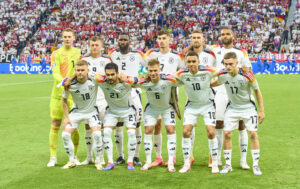Croatia have been eliminated from Euro 2024 in the group stage. It is the first time in a decade that they have left a major tournament that early. In terms of the European Championships, it is the first such elimination since 2012. Here we bring you five things we learnt from the early Croatia Euro exit.
Five Things We Learnt From the Croatia Euro Exit
Hype Doesn’t Always Translate to Success on the Field
There is of course a reason as to why the number one thing we can take away from this disappointment has to do with hype. Hype and pressure followed this team everywhere they went.
Especially after the 2-1 victory away to Portugal in the last friendly match in preparation for the tournament in Germany set the euphoria surrounding coach Zlatko Dalic’s side into overdrive, local sports pundits were eager to proclaim that this was the finest Croatian national side of all time.
Read More: Netherlands Euro 2024 Group Stage: 5 Things We Learnt
It was always going to be a nearly impossible task for the team to live up to, given the greats that have worn the red and white checkered jersey from the mid to late 1990s like Davor Suker and Zvonimir Boban, let alone the players that reached the 2018 World Cup final, such as Ivan Raketic, or Mario Mandzukic.
The Key Players of the Vatreni Are Too Old
There are many positive things to be said about Luka Modric in particular. His great career at Real Madrid and the national team, his personality and his leadership skills. But the fact of the matter is that he is 38 years old and it is beginning to show. It has long been time for him and others to pass the torch on to the next generation.
Read More: Mexico Predicted Lineup vs Venezuela for Copa America 2024
Ivan Perisic, another great servant to Croatian football over the years is 35, while Andrej Kramaric is 33. The latter has not helped the cause much this tournament, either as a winger or as a number nine, even with his one goal vs Albania. Be that as it may, age was clearly a factor in the Croatia EURO exit.
Coach Dalic Was Too Stubborn in Sticking to His Approach
Of course, no one knows his players better than the coach. But normally most coaches do tend to change course when one particular approach does not work. Yet, Dalic held onto his 4-3-3 formation with the underperforming Marcelo Brozovic in it.
Brozovic’s passing was rarely positive. He attempted 186 passes throughout the group stage, only 19 of those were into the attacking third, while a mere two went into the penalty area. During his time on the pitch, he attempted four crosses, two of which did not reach their intended target.
Read More:USMNT Panama Lineup Prediction: Important Player Building Fitness
Many Croatian observers wanted Brozovic benched for the second and third matches. They hoped that Dalic might implement a 4-2-3-1 without the Al-Nassar man in it. That of course, never happened.
A Football Match Doesn’t Necessary Last 90 Minutes
Croatia’s biggest failure at this tournament, besides getting hammered 3-0 by Spain in their first match was the fact that they gave away leads deep inside added time in both of their subsequent encounters.
It was a 95th minute equalizer that pegged them back against Albania and 98th minute heartbreak that ended their dreams against Italy. Why the referee of that game saw the need to add eight minutes to a second half that for the most part moved along as most second 45s do is another matter.
Read More: A Look Back at the Three Spain vs. Croatia Euro Meetings
What is for sure, however, is that the quote of famous West-German 1954 World Cup-winning coach Sepp Herberger that a match lasts 90 minutes no longer applies. Today a match lasts until the referee blows the final whistle.
Respect for a Small Country’s National Team Is Nearly Impossible to Earn
Despite the team’s recent success, mostly at World Cups, global sport and football pundits will never put Croatia in the same category as larger countries that have had less constant success of late. For that reason, they do not tend to treat the Croatia Euro exit as the shock that it is.






